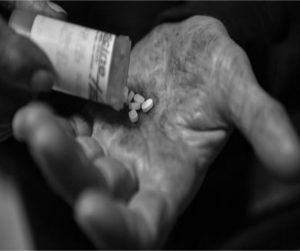Navigation:
[vc_row][vc_column][vc_cta h2="Help Is Only A Phone Call Away" txt_align="center" shape="round" style="flat" color="vista-blue" el_width="sm" use_custom_fonts_h2="true" use_custom_fonts_h4="true"]Call Now 855-227-9535[/vc_cta] Buprenorphine is an interesting substance. It is able to suppress the debilitating symptoms of opioid withdrawal, but this substance is also an opioid itself. It helps control intense cravings experienced after abruptly quitting a drug. And yet some people abuse this prescription drug and get addicted to it. It’s nearly as ironic as how most prescription drugs are helpful unless you misuse them. Buprenorphine makes the addiction treatment process much more bearable. It helps patients properly engage in therapy, counseling, and support. Because of its fascinating qualities, it’s worth taking a closer look at the functions and properties of buprenorphine. How does it work? And specifically, how long does it stay in your system? Information like this can go a long way in fighting addictive behavior. Let’s get started.What is Buprenorphine?
 First things first: what is this drug that we’re talking about? Buprenorphine is a prescription medication derived from thebaine, which is an alkaloid of the poppy Papaver somniferum. At low doses, it produces enough agonist effects to enable drug addicted people to discontinue the misuse of opioids. As we mentioned previously, buprenorphine itself is an opioid. Opioids are synthetic and semi-synthetic substances derived from the opium poppy plant, unlike opiates which are natural derivatives. In the medical industry, both opiates and opioids are called narcotics. However, the term narcotic is more loosely used in law enforcement. It may refer to any mind-altering substance, regardless of whether it’s an opiate or not. It can even refer to any illegal drug, even if it’s not a prescription medication like most opioids.
First things first: what is this drug that we’re talking about? Buprenorphine is a prescription medication derived from thebaine, which is an alkaloid of the poppy Papaver somniferum. At low doses, it produces enough agonist effects to enable drug addicted people to discontinue the misuse of opioids. As we mentioned previously, buprenorphine itself is an opioid. Opioids are synthetic and semi-synthetic substances derived from the opium poppy plant, unlike opiates which are natural derivatives. In the medical industry, both opiates and opioids are called narcotics. However, the term narcotic is more loosely used in law enforcement. It may refer to any mind-altering substance, regardless of whether it’s an opiate or not. It can even refer to any illegal drug, even if it’s not a prescription medication like most opioids.
How Long Does it Stay in your System?
The reason we’re discussing this is that many people taking buprenorphine may be concerned with how long it will stay in their system. The length of time depends on a number of factors, and the half-life is just one of them. Buprenorphine has an especially long elimination half-life compared to other opioids. That’s what makes it so effective as a part of a comprehensive addiction treatment plan. It stays attached to opioid receptors for up to 3 days. This means it can block all other opioid effects from coming in for that same amount of time. Drug users can’t get high on their opioid of choice, because buprenorphine is already taking up its space. At the same time, the mind is tricked into thinking it has received the same amount of opioids. This makes withdrawal much easier to deal with. The process of detox is slow and gradual, and medications like buprenorphine make it possible. [maxbutton id="3" ] It takes the body almost two full days to excrete 50% of the buprenorphine in a dose of Suboxone (a drug that contains buprenorphine as its main active ingredient). Other variables can change the length of time that buprenorphine remains in your system. A person’s age, body weight, body mass, height, genetics, hydration, liver function, metabolic rate, drug history, medical history, physical fitness, duration of use, frequency of use, presence of other drugs, etc. If you know someone who is abusing buprenorphine, look for an addiction treatment facility near you today!
The previous blog post How Long Does Buprenorphine Stay in Your System? is available on Rehab Near Me
from
https://www.rehabnear.me/buprenorphine-in-the-system/

No comments:
Post a Comment